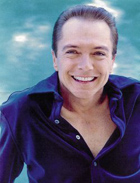
David Cassidy on the Web
'90s boy bands changed society's tune on manliness, says Dal musicology student
May 13, 2010
By: Melanie Patten
The Canadian Press
www.winnipegfreepress.com
The boy bands that dominated the airwaves a decade ago have changed society's tune on what's considered masculine for today's pop phenoms and musical theatre heartthrobs, says Craig Jennex, a gender studies and musicology student at Dalhousie University.
Jennex, 23, has spent the last year studying the social impact of the bands, namely the Backstreet Boys and 'N Sync - the highest and second-highest grossing groups when the genre exploded in the late '90s.
Everything from their song lyrics, their choreography to their singing style "challenged our concepts of what was proper for young men to be doing," says Jennex, who's originally from Dartmouth, across the harbour from Halifax.
"They really made our concepts of adolescent masculinity a lot less rigid, which I think is a good thing. I think there's a lot of young people out there who certainly don't fit into our ideals for young male masculinity in terms of gender performance and sexuality."
Jennex, a drummer in a folk-rock band who admits he never really listened to boy bands before his research, has written a 50-page undergraduate thesis on the subject. He's due to present his work in June at the Canadian conference for the International Association for the Study of Popular Music.
"I really want to show people how important pop music is to us in our everyday lives and I knew if I could do that with boy bands, then maybe people would start thinking about pop music differently," he says.
"I think I was up for the challenge, that's for sure."
In his thesis, Jennex links the performance technique of late '90s boy bands - they sing, they dance but they don't play instruments - to the musical style typically associated with black male R&B groups. He points to Boyz II Men, whose soulful harmonies attracted legions of female fans in the '90s. Jennex also points to their old-school predecessors such as the Four Tops and the Temptations.
The only other genre that features a group of men singing and dancing without playing an instrument, he says, is barbershop, which is rooted in black culture.
"The boy bands came along, and danced just as much as they sang," he says. "It's now an acceptable way for young people to display their masculinity."
Unlike many male-dominated rock bands in the late '90s, Jennex says boy bands sang openly and frankly about emotions while using what's known as modulation - when lyrics are suddenly belted out in a higher key for emphasis.
Jennex says modulation is commonly associated with female singers, not to mention a sharp contrast with electric guitar-wielding rockers who use amplified solos to express emotional outbursts.
"The thing with rock music is it's always singing about lust, whereas pop has always been about love and feelings and emotions," he says.
And despite countless boy band videos featuring sobbing, screaming girls, Jennex also argues the groups often used non-specific lyrics such as "honey," "baby" and "you," leaving the intended audience purposely ambiguous.
Without female singers, Jennex says the constant interplay of male voices means some songs can be construed as describing a same-sex, romantic relationship between band members. The interpretation is left up to the listener.
Boy bands made "boundaries a little less rigid when it comes to sexuality and gender," says Jennex.
"I think they have created a safer space for young men to perform their masculinity and to grow."
Prof. Jacqueline Warwick, who supervised Jennex's thesis, says while boy bands are often dismissed as "fluffy and insignificant," they've helped open the door for today's singing and dancing superstars.
As an example, Warwick cites '70s sensation David Cassidy and current teen idol Zac Efron. Like Efron in the "High School Musical" franchise, Cassidy both sang and acted during his time on the television show "The Partridge Family." But whereas Cassidy played a musician on TV, Efron plays a popular jock who also happens to enjoy dancing and singing.
Efron is "modelling a very different kind of teen male identity than what was possible before the boy bands," says Warwick, associate professor of music at Dalhousie.
After months of research, countless hits for the Backstreet Boys and 'N Sync on YouTube and the occasional peek at online teen magazines, Jennex admits he's had enough of listening to boy bands.
But he encourages music lovers to dissect what's on their own iPods.
"Pop music is so ubiquitous that we don't realize how important it is," says Jennex, who plans to pursue cultural studies and critical theory at McMaster University in Hamilton, Ont., this fall.
"But we really need to unpack and understand the music that we all identify with to really understand who we are as individuals."
